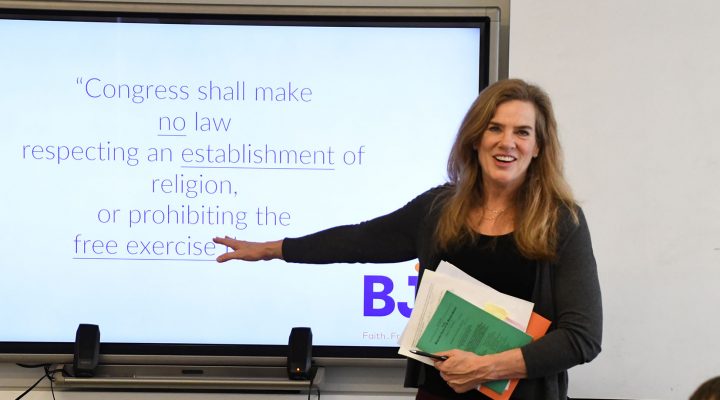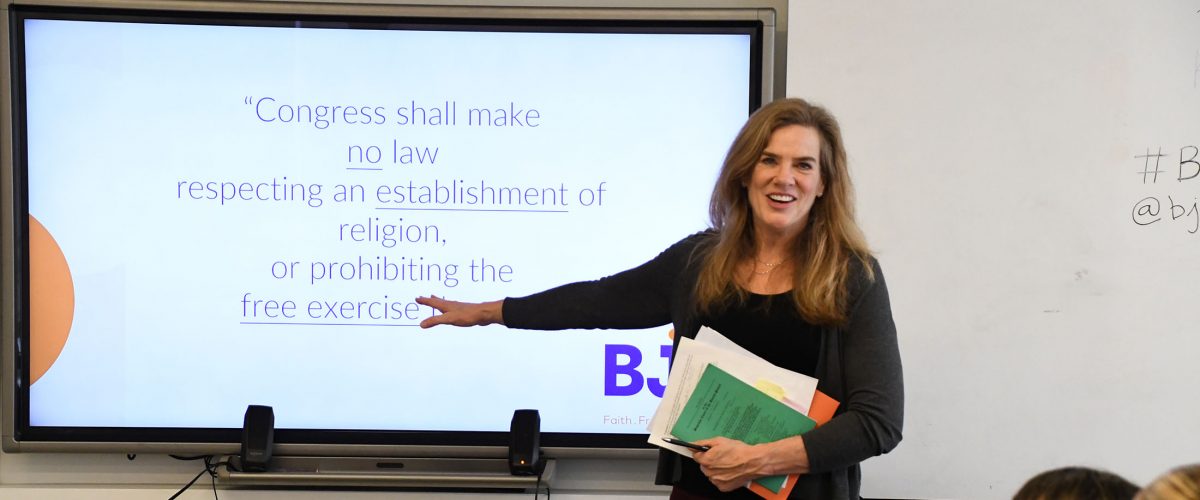Louisiana is making history, and not the good kind.
As the only state with a law mandating displays of the Ten Commandments in every public school classroom, Louisiana is a standout among a host of states pursuing legislative measures that would upend religious freedom as we know it.
Last year, its neighbor to the west proposed a similar Ten Commandments bill. But after hearings on the matter and opposition from many religious voices, the Texas Legislature rejected that bad idea. At least for now.

Holly Hollman
You may be thinking the Ten Commandments are part of sacred Scripture in the Jewish and Christian traditions — although the significance in those traditions differs — and that public schools must serve all children without regard to religion, right? True. So why is this happening, and isn’t it unconstitutional?
The application of the First Amendment’s ban on any government establishment of religion is famously nuanced. That is particularly so when it comes to religious displays on government property. Typically, both the content and the context must be carefully considered. It is important to distinguish between an appropriate artistic or historical reference to religion, such as one that recognizes religion’s role in society, from an alarming attempt by the government to promote a purely religious agenda or enforce conformity.
Permanent religious displays in public school classrooms have long been seen as easily on the unconstitutional side of that equation.
“The Ten Commandments are undeniably a sacred text in the Jewish and Christian faiths, and no legislative recitation of a supposed secular purpose can blind us to that fact.” That’s what the U.S. Supreme Court said in an unsigned opinion in Stone v. Graham (1980), finding unconstitutional a Kentucky law that required posting the Ten Commandments on the wall of each public school classroom. The religiously coercive purpose and effect were clear in that context and so was the constitutional violation.
“It is the next step in an agenda to erode religious freedom for all and to promote Christian nationalism.”
The Louisiana law is designed to challenge that precedent. It is the next step in an agenda to erode religious freedom for all and to promote Christian nationalism. We’ve seen some states pass laws to mandate postings of the motto “In God We Trust” in classrooms without any context — a heavy-handed legislative effort that purports to promote patriotism while undermining church-state separation. Louisiana’s new law goes further by mandating a government-edited and approved version of Scripture hang on each classroom wall in every public school according to the government’s specifications. The legislation is designed to try to stretch legal boundaries that appear increasingly elastic.
Recent cases show the current U.S. Supreme Court is less concerned with certain government actions that threaten to create an establishment of religion than in previous years. In fact, a few days before signing the Louisiana measure, Gov. Jeff Landry said he looked forward to being sued. And, indeed, a group of nine Louisiana families with children in public schools filed suit in federal court on June 24 to block the law. The plaintiffs are represented by the ACLU, the ACLU of Louisiana, Americans United for Separation of Church and State, and the Freedom from Religion Foundation.
It is disconcerting that the Louisiana Legislature did not respect a fundamental concern that so many families recognize. As stated in a petition to the governor from faithful Louisianans (organized by the Cooperative Baptist Fellowship): “The responsibility of religious education belongs to families, churches and other religious institutions, not the government. Our communities of faith exist to help individuals and families grapple with applying biblical truth in our modern times. We do not need or want legislators and other government officials interfering with and usurping this sacred role.”
We agree. Government-mandated displays of the Ten Commandments disrespect religious diversity and are likely to foster conflict over religion in our public schools. By taking on the role of religious authority and enacting this legislation, the state has betrayed its role as protector of religious freedom for all.
Holly Hollman serves as general counsel for BJC in Washington, D.C.
Related articles:
Gov. Landry gets his wish: Louisiana Ten Commandments law to be challenged in court
Baptists oppose Louisiana Ten Commandments bill
Gov. Landry and the new Ten Commandments | Opinion by Michael Friday
If you want to post the Ten Commandments in schools, you ought to learn more about them | Analysis by Rick Pidcock
Ten Commandments bill dies in Texas Legislature


